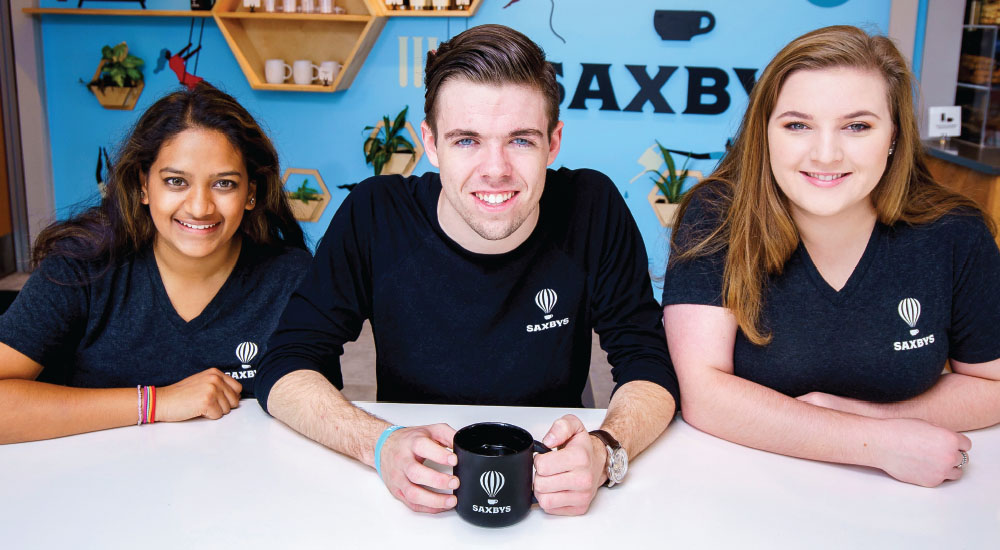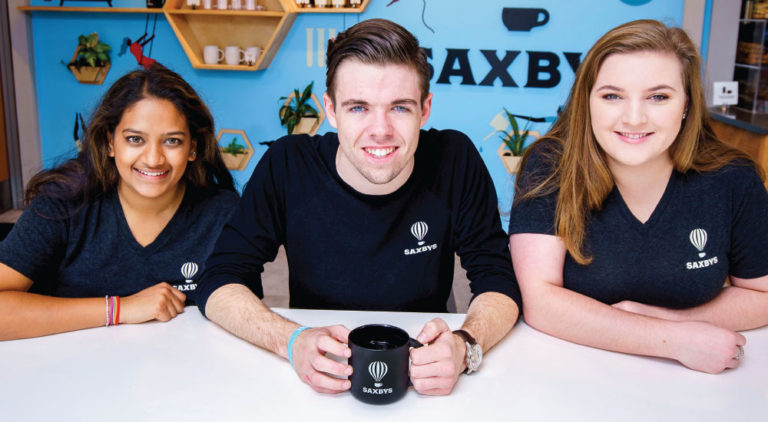
Jhanvee Patel, Dan Kinsinger and Christina Sokolowski began working at Saxbys as baristas before moving into leadership roles, where they are now hiring and training others.
A little summer cash.
It’s the usual reason college students take gigs as baristas, and Dan Kinsinger was no different. But he got a lot more than he bargained for when he applied for a part-time job pulling espresso shots for his classmates at the Saxbys café at 34th Street and Lancaster Avenue in 2015.
He didn’t know much about Saxbys then — nothing about its one-of-a-kind experiential learning program, nor that it employed an all-student staff tasked with full responsibility for marketing, inventory, personnel and profits.
He sure does now, though.
Saxbys’ 34th Street café was the company’s first location run by students, through a partnership with Drexel that allows student employees to earn co-op credits. After starting as a barista, Kinsinger spent his first six-month co-op overseeing operations as a student café executive officer, the top leadership role in the café. Two years since he first joined the company, he’s in the midst of a second co-op supervising other student CEOs in cafés across Philadelphia. And he’s just a junior.
“Having the opportunity to run your own business while still an undergrad is something you can’t learn in a classroom,” Kinsinger says.
“There’s nothing an accounting or business class could have done to prepare me as well as actually running a business in the real world. It’s a do-ordie thing.”
When the 34th Street café opened in April 2015, Saxbys CEO Nick Bayer had the idea to use it as a way for students to broaden their business skills in an attractive, comfortable setting. He pitched it to BaseCamp Ventures Managing Partner Mel Baiada ’82, ’85, a Drexel trustee and benefactor, and Baiada put him in touch with President John Fry, who saw it as an ideal extension of the University’s cooperative-education mission — a kind of “co-op on steroids,” Fry calls it.
At the two locations on Drexel’s campus, students fill every position and complete every task. They make every drink, analyze and present every profit-and-loss report, organize every team meeting, plan every marketing push and schedule every event.
“We’re teaching the building blocks that young professionals need to be difference makers in whatever career they go into,” Bayer says. “It’s a great business to be able to teach those things, and Drexel has seen this as much more than a coffee shop. John [Fry] saw it on Day One when I pitched this. He said this is an academic partnership, not a food-and-beverage partnership. He saw the potential before I saw it.”
Saxbys now has four student-run cafés; in addition to the 34th Street Café and the one in Drexel’s Papadakis Integrated Sciences Building at 33rd and Chestnut streets, there is one at Temple University and another at Millersville University, an hour and a half west of Philadelphia. A fifth will open this spring at La Salle University. Starting this spring, Drexel’s Close School of Entrepreneurship will begin offering a suite of courses that integrate Saxbys talent initiatives with leading entrepreneurial research to students working at Saxbys.
To date, 14 Dragons have served a co-op with Saxbys, coming from majors as disparate as legal studies, engineering and culinary science. Seven of those co-ops have been café executive officers, along with others in product development, marketing and operations, and accounting.
Altogether, counting both co-op students and regular employees, Saxbys has hired 58 Drexel students and alumni. Students have accounted for more than $500,000 in payroll since the first café opened on campus three years ago. Three members of the class of 2017 joined Saxbys’ corporate management staff in Center City full-time after graduation.
“I’m not sure there’s a better résumé builder for an undergrad,” Bayer says. “Regardless of the industry you go into, the ability to be entrepreneurial, manage people and take responsibility for something as large and challenging as a café is a life-changing opportunity.”
“Regardless of the industry you go into, the ability to be entrepreneurial, manage people and take responsibility for something as large and challenging as a café is a life-changing opportunity.” — Nick Bayer
The idea for an educational relationship between Drexel and Saxbys bloomed just as the coffee company was undergoing a radical transformation that began in 2012. Saxbys had been selling franchises since 2005, but brand cohesion had suffered, Bayer believed. When the company was purchased by a private-equity firm and reorganized, he saw a chance to reorient around a culture- and community-driven ethos — not unlike the one Fry has brought to the University.
Bayer had the company’s new mission statement, “Make Life Better,” painted on a wall alongside six core values in Saxbys’ airy headquarters and went to work acting on those words. The company bought out most franchisees and set about reinventing itself.
“With its community-focused ideals, Saxbys is the perfect partner for Drexel — a company that knows how to nurture and mentor young professionals who understand the imperative for businesses to give back, as well as earn a profit,” Fry says.
Student employees helped the company achieve its new goal of turning cafés into hives of community, where the people behind the counter aren’t just baristas, they’re neighbors, classmates, friends.
“It creates a super unique culture that you can’t really mimic in any other way,” Kinsinger says of the decision to hand the reins to students. “It’s a crazy balance. You’re learning how to run a business yourself, as a 19- or 20-year-old in charge of an incredibly successful business, but at the same time you’re working with all your friends, so it doesn’t feel like work.”
“When I first applied for this co-op I thought, ‘How can 20-year-olds run a café?’” recalls Christina Sokolowski, a hospitality management major.
In time, she learned that she was truly free to chart her own path, no training wheels needed — and she now runs Saxbys 34th Street café.
Jhanvee Patel, a junior studying biological sciences who started as a part-time barista and has since risen to be an operations specialist overseeing new team development, says Saxbys’ culture is key to empowering student employees. Everyone, from baristas to student CEOs, is invited to share ideas or seek advice from the company’s headquarters.
“It’s really cool that as a 20-year-old at Drexel, I can go up to the CEO of a huge company and do that,” Patel says. “That filters down through all the different levels in the business.” Bayer asks co-ops to focus on team development, community building and financial management — which the company calls the three pillars of business. Given the complicated nature of supervising your sorority sister, or your best friend, or the baristas who started working at the café before you even applied to take it over, the first part is often the hardest.
Navigating through that potential thicket was a challenge for Sokolowski when she took over at 34th Street in April, but she says she’s developed into a better listener and communicator as a result.
“You need to have grit,” Sokolowski says. “You have to have this tough outer layer, but to have that you should have a great support system you can fall back on.”
And who better to guide a Drexel student through the rigors of running a business than a fellow Dragon? Sokolowski says that as she has grown personally and professionally, the experience has become far more than a job.
“It’s something I can see myself doing for the rest of my life,” she says.
Interested in having Close School of Entrepreneurship faculty come to your company to conduct a mini-course on the best research on talent development? Contact Damian Salas, assistant dean, Close School of Entrepreneurship: 215.895.2335.


